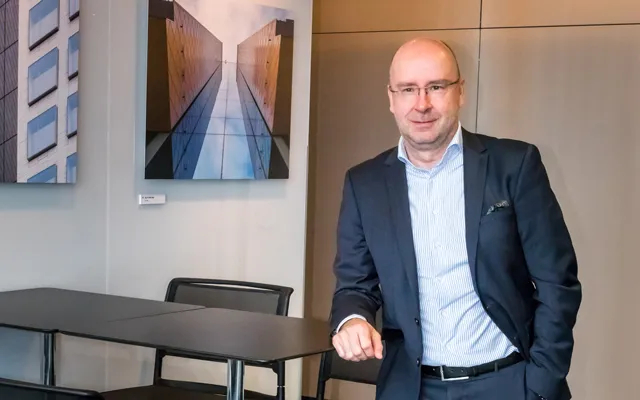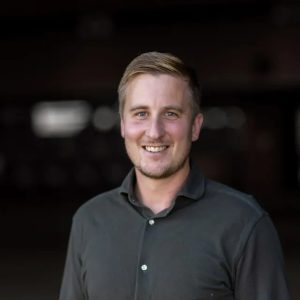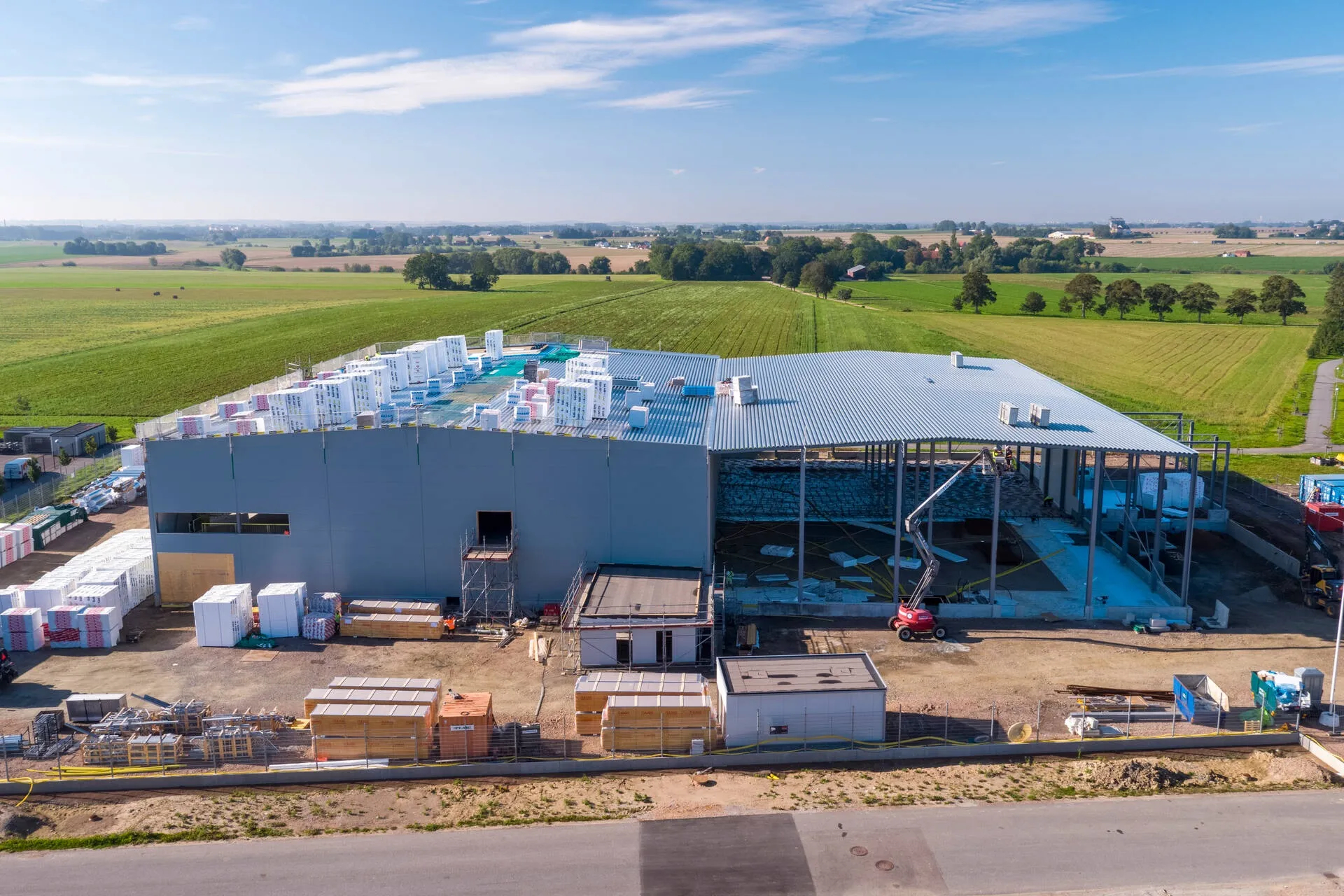Peab and SSAB have taken the next step in their collaboration and, together with Ruukki Construction and the property company Wihlborgs, presented the world’s first building with fossil-free steel in Lund, Sweden. The building’s wall and roof structures have been designed and produced by Ruukki Construction. Ruukki is part of SSAB and a supplier of steel-based building products and services for roofs and walls for sustainable buildings.
Nordic sustainability frontrunners
Working closely with Smidmek, part of Peab Byggsystem (one of the largest construction companies in Sweden), the Ruukki team have designed, calculated the dimensions and produced the building’s wall and roof structures. Sandwich panels have been used for the walls to create an energy-efficient building envelope with low energy consumption throughout its lifespan.

“Products made from fossil-free steel are part of Ruukki’s aspiration to take the construction industry towards carbon-neutral buildings. The Nordic countries, and Sweden in particular, are pioneers in sustainable construction. This project is an excellent example of how we can revolutionize the future of construction together with our customers,” says Sami Eronen, President of Ruukki Construction.
“Tomaten 1 is a modern industrial facility that from the start had high sustainability requirements to achieve the Sweden Green Building Council’s Silver certification, a high rating for an industrial facility. Together with Smidmek Ruukki was responsible for the design of the roof and wall structure as well as the production of the T130M roofing sheet and the SPA E Life sandwich panels, where some of the conventional steel has been replaced with fossil-free steel. This multi-party collaborative project required working closely together to ensure smooth implementation, and we are proud to be part of the project,” Mr. Linus Eriksson, Sales Engineer for Tomaten 1 Ruukki Sverige AB, elucidated.
Ruukki’s current Life panels already have a carbon footprint that is 20% lower than that of the average European mineral wool panel. The core of the Life panel is made of glass wool, with over 70% of the material being made from recycled glass.
A major milestone
When asked about the significance of this milestone for his company, Mr. Per Göransson, Business Director, Ruukki Scandinavia, commented: “For Ruukki, this is a significant milestone in our efforts to reduce the carbon footprint of our offering, and we are extremely proud of the achievement. This also means that our customers can expect a greener and more sustainable future for their construction projects. It is a clear sign of our commitment to reducing the carbon footprint and offering innovative solutions for the construction industry.”

He went on to add that the market for fossil-free steel looks promising. “Interest is high, and the number of customer inquiries is growing. The trend is being driven by increased environmental awareness in society and the need to reduce emissions in the construction sector. More and more companies are working to reduce their environmental impact, and choosing fossil-free steel will be an important part of their sustainability strategy.”
Mr. Eriksson agrees with this scenario. “We are noticing increased environmental awareness among our customers, and higher sustainability requirements are being placed on projects. The choice of material is crucial and interest both in fossil-free and recycled steel is growing steadily. Fossil-free steel marks the start of a green transition in the construction industry. To succeed, we all need to work together,” he stated.

Commercial scalability is the most frequently discussed topic. Mr. Göransson has optimistic news on that front as well: “Fossil-free steel will be available at a commercial scale from 2026. Until then, we aim to gradually improve our customers’ access first to recycled-based SSAB Zero® steel and then to fossil-free steel as its availability improves. As part of the SSAB Group, we had the opportunity to be the first to produce building products featuring fossil-free steel, and we will continue to ensure availability for our customers through SSAB.”
“As a part as part of SSAB, we are ensured access to the material. As early as next year, in 2024, we will be able to offer significant volumes of, SSAB Zero® steel that is made of recycled steel and produced with fossil-free electricity and biogas to meet customer needs,” claimed Mr. Eriksson.
A significant contribution

The members of the Ruukki team are aware that the construction of new buildings, and likewise the production of building materials and products, has a significant climate impact. The transition to fossil-free steel is an important step in reducing the environmental footprint of their industry.
“A joint research project between Peab and SSAB is investigating the environmental benefits of SSAB’s fossil-free steel made using HYBRIT technology. We eagerly await the results of their work,” stated Mr. Rasmus Larsson, Portfolio and Sustainability Manager Ruukki Scandinavia.
“In 2026, when fossil-free steel is produced at a commercial scale, we estimate that buildings like Tomaten would reduce the environmental impact of the building envelope by 50%. This development is a valuable step towards a more sustainable and circular construction industry,” he continued.
Approach to sustainability
Ruukki strives to promote the development of sustainable building products and reduce the carbon footprint of the construction industry by starting with the entire life cycle of a product and dividing the work into four categories. The company´s product development process focuses on ensuring that the products are not only manufactured sustainably but are also sustainable during and after their lifetime.

“We are constantly looking for new raw materials, including fossil-free and recycled-based steel to reduce our dependence on non-renewable natural resources and lower the environmental impact of our products,” explained Mr. Larsson.
“Although steel is a significant product component, we also focus very much on the use phase, as this represents a much longer part of the product’s life cycle. For example, our energy-efficient solutions offer significant energy savings and so reduce carbon dioxide emissions during the building’s lifetime,” he added.
In conclusion, Mr. Eriksson emphasizes that the ability to offer both SSAB Fossil-free steel and recycled-based SSAB Zero® steel is a milestone, and it is something that will give their customers a tangible advantage. Not only are they proud of this step, but they are convinced that it is a crucial development for the entire industry.


